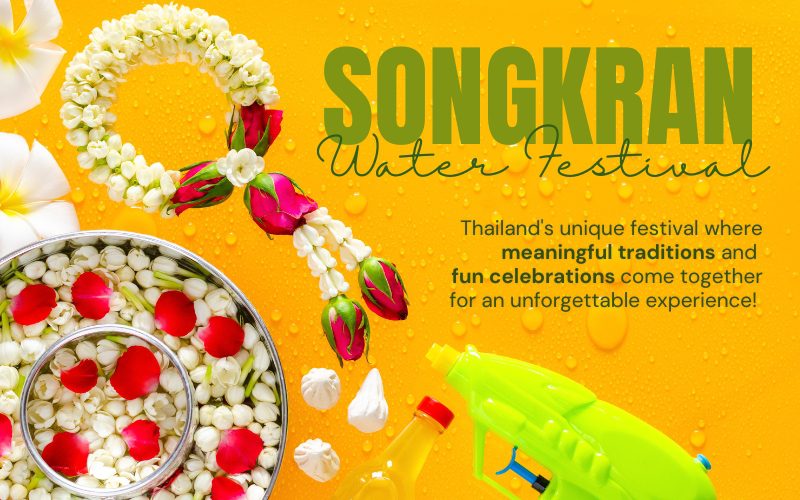
The Songkran Festival, also known as the Thai New Year, is one of the most vibrant and eagerly awaited celebrations in Thailand. Taking place annually in April, Songkran marks the beginning of the traditional Thai New Year and is famous for its spirited water fights, cultural rituals, and communal festivities. Rooted in rich cultural traditions, this festival symbolizes purification and renewal, where water plays a central role in cleansing and blessing. Whether you’re in bustling Bangkok, historic Chiang Mai, or the scenic beaches of Phuket, Songkran offers a unique and immersive experience of Thai culture, making it an unforgettable adventure for locals and tourists alike.
History and Origins of Songkran
Historical Background of Songkran
The Songkran Festival has its roots deeply embedded in ancient traditions and cultural practices. The term “Songkran” is derived from the Sanskrit word “Sankranti,” which means the astrological passage or transformation. Originally, Songkran marked the beginning of the solar calendar, coinciding with the arrival of the New Year according to the Buddhist and Hindu solar calendars. This festival was a time of renewal and purification, signifying the end of the dry season and the onset of the rainy season, which is crucial for Thailand’s agriculture.
Traditional Significance and Meaning of Songkran
Traditionally, Songkran is more than just a festive occasion; it holds profound spiritual and cultural significance. Water, which plays a central role in the celebrations, symbolizes purification and the washing away of sins and bad luck. During Songkran, Thais engage in merit-making activities such as visiting temples, offering food to monks, and pouring water over Buddha statues. Another important tradition is the gentle pouring of water on the hands of elders and family members as a gesture of respect and to seek blessings for the coming year. This ritual, known as “Rod Nam Dum Hua,” reinforces family bonds and the importance of reverence for the elderly.
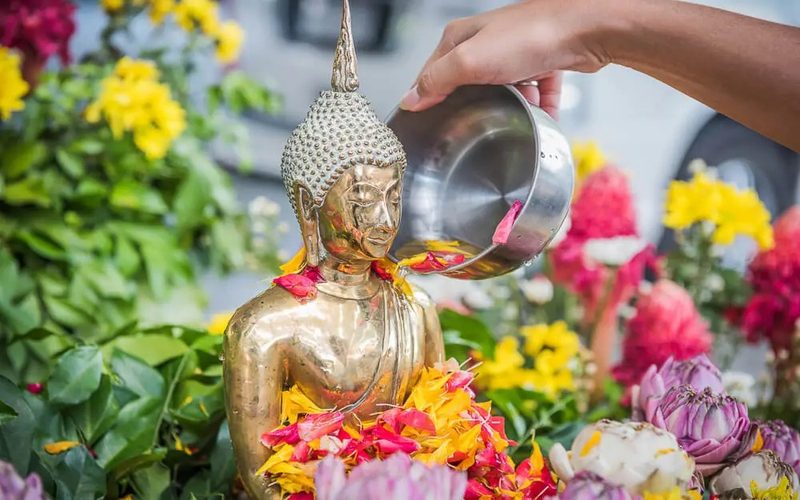
Pouring water over Buddha statue in Songkran
Evolution of Songkran Over the Years
Over the centuries, Songkran has evolved from its humble beginnings into the grand festival it is today. Initially, the celebrations were modest, focusing primarily on religious ceremonies and family gatherings. However, as the festival gained popularity, the nature of the celebrations began to change. In the modern era, Songkran has transformed into a nationwide event known for its lively water fights and street parties. Major cities like Bangkok, Chiang Mai, and Phuket host large-scale events that attract both locals and international tourists. Despite these changes, the core essence of Songkran—respect, purification, and renewal—remains intact, blending traditional practices with contemporary festivities. This evolution reflects Thailand’s dynamic culture, where ancient traditions harmoniously coexist with modern influences.
Key Traditions and Rituals
Water Pouring and Its Significance
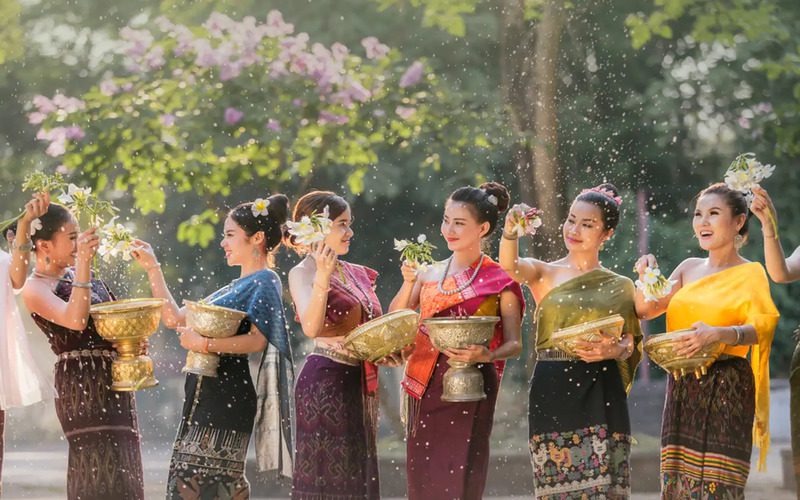
Water pouring in Songkran Festival
One of the most iconic traditions of the Songkran Festival is the pouring of water. This ritual, originally a gentle and respectful act, involves pouring water over the hands of elders and family members. The water is often scented with floral petals, symbolizing the cleansing of past misfortunes and the blessing of good luck for the year ahead. In contemporary celebrations, this tradition has evolved into lively water fights, where people splash water on each other in the streets. This playful practice is seen as a way to wash away the old year and welcome the new, bringing a sense of communal joy and renewal.
Sand Pagodas and Merit-Making Activities
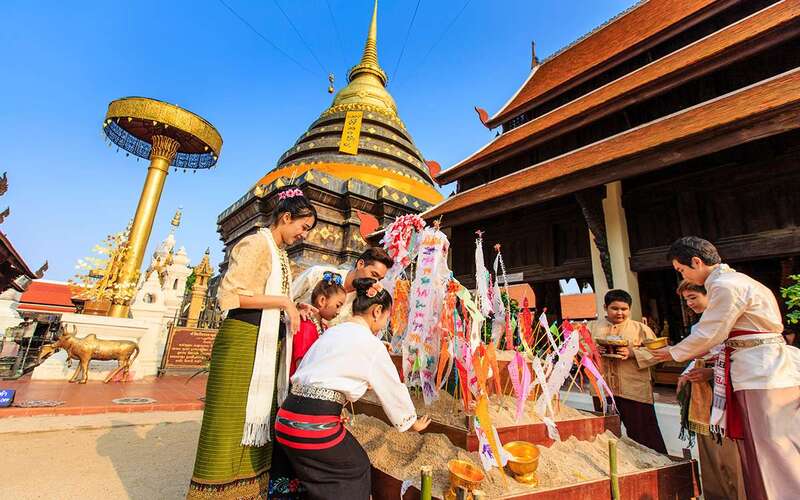
Building sand chedi with traditional flags
Building sand pagodas, or “chedi sai,” is another cherished tradition during Songkran. Families and communities gather at temples to create small sand stupas, which are often decorated with colorful flags and flowers. These pagodas symbolize the mountains of Buddhist cosmology and serve as an act of merit-making. The sand represents the dirt carried away from the temple grounds by visitors over the year, and returning it is believed to bring spiritual merit. Other merit-making activities include visiting temples, offering food and alms to monks, and participating in traditional ceremonies. These acts of generosity and devotion are central to the spiritual aspect of Songkran, reinforcing the festival’s themes of renewal and purification.
Traditional Thai New Year Rituals
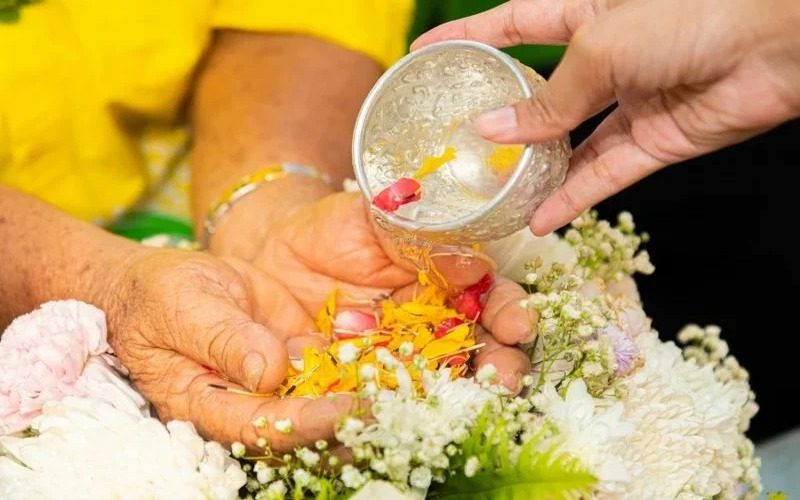
Rod Nam Dum Hua Ritual
Songkran is deeply rooted in traditional Thai New Year customs, which emphasize family and community bonding. One of the key rituals is “Rod Nam Dum Hua,” where younger family members pour fragrant water over the hands of elders and ask for their blessings. This act of respect and humility strengthens familial ties and honors the wisdom of the older generation. Additionally, many Thais take this opportunity to clean their homes and rid them of bad luck, symbolically preparing for a fresh start. Traditional games, dance performances, and cultural displays are also common during the festival, providing a vibrant showcase of Thailand’s rich heritage. These rituals and customs highlight the festival’s deep cultural significance and its role in preserving Thai traditions.
Exciting Songkran Activities
Water Fights and Street Parties
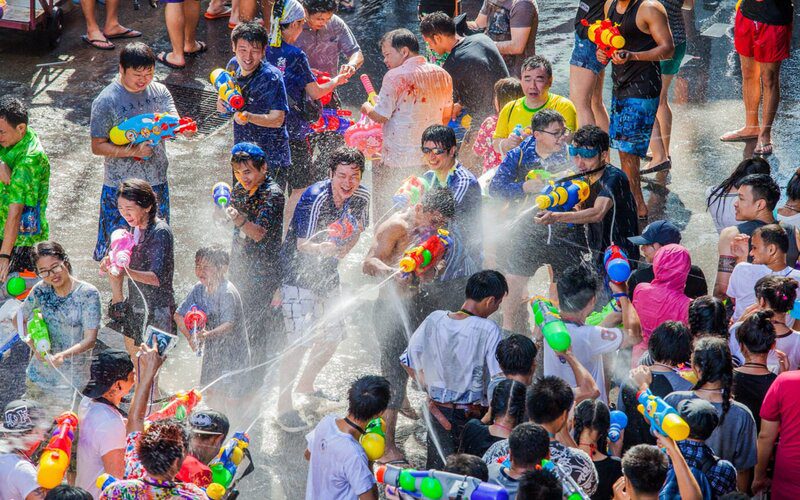
Exciting water fight in Songkran
One of the most anticipated aspects of Songkran is the exuberant water fights that take over the streets of Thailand. In cities like Bangkok, Chiang Mai, and Phuket, locals and tourists alike gather with water guns, buckets, and hoses, engaging in playful battles that symbolize the washing away of the past year’s misfortunes. Streets are closed to traffic, transforming into lively arenas where everyone is fair game for a soaking. These water fights are not just fun but also a unique way to experience communal joy and celebration. Street parties complement the water activities, with music, dancing, and street food adding to the festive atmosphere.
Traditional Performances and Cultural Shows
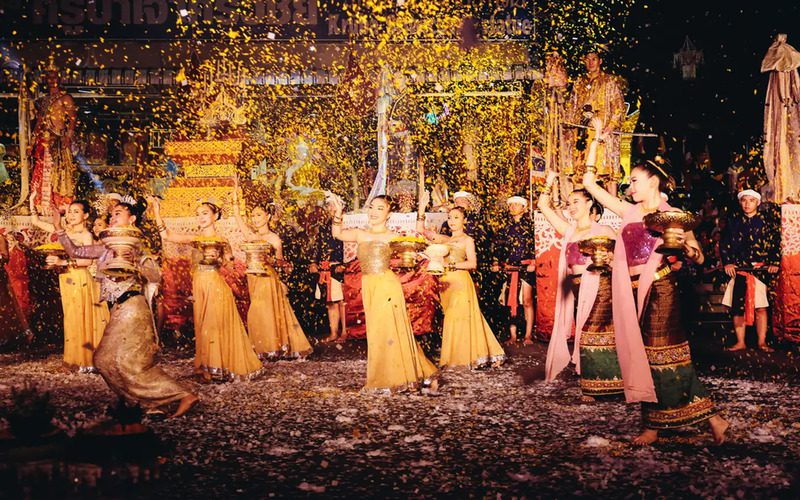
Songkran Performance
Songkran is also a time to celebrate Thai culture through various traditional performances and cultural shows. Visitors can enjoy classical Thai dance, music performances, and dramatic re-enactments of historical events. Many towns and cities organize cultural fairs where artisans demonstrate traditional crafts and local performers showcase folk music and dance. These events provide a deeper understanding of Thailand’s rich cultural heritage and offer a colorful and engaging way to experience the festival beyond the water splashing.
Temple Visits and Religious Ceremonies
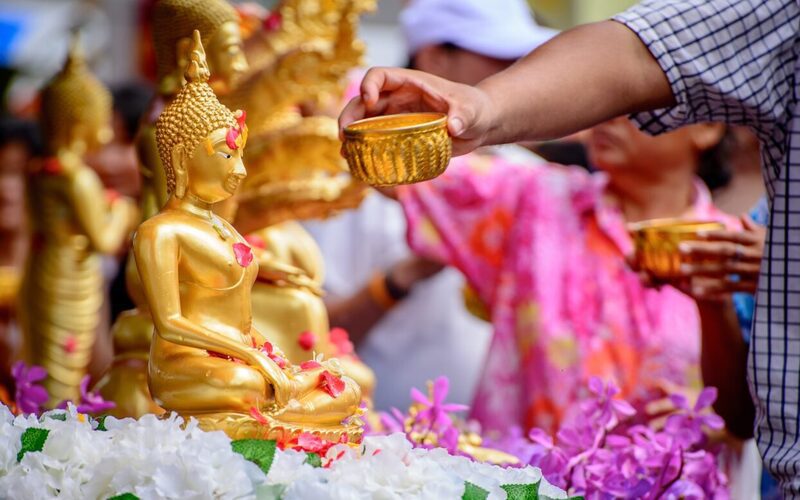
Visiting temples and bathing Buddha statues in Songkran
Amidst the festive chaos, Songkran retains its spiritual essence through temple visits and religious ceremonies. Many Thais visit their local temples to offer prayers, give alms to monks, and participate in traditional rituals such as bathing Buddha statues with scented water. These activities are believed to bring good luck and merit for the coming year. Special ceremonies are also held, where monks chant blessings and lead the community in prayer. These spiritual practices provide a peaceful and reflective counterbalance to the high-energy water fights, emphasizing the festival’s deep-rooted significance in Thai culture.
Community Events and Parades
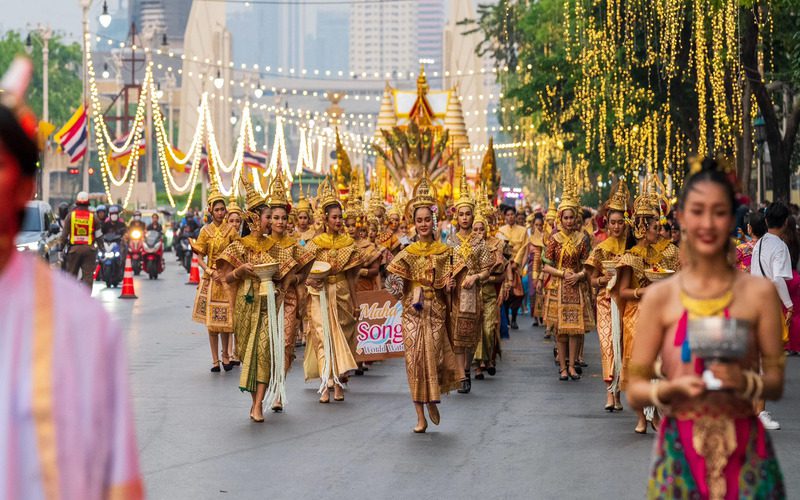
Songkran Parade
Community events and parades are a vibrant part of Songkran celebrations. Parades often feature elaborately decorated floats, traditional music, and dancers in colorful costumes. In some regions, beauty pageants are held to crown the Songkran Queen, adding a touch of glamour to the festivities. Local communities come together to organize these events, creating a sense of unity and shared joy. These parades and community gatherings highlight the collective spirit of Songkran, where everyone is invited to join in the celebration and experience the warmth and hospitality of Thai culture.
Songkran Food and Drinks
Traditional Thai Dishes Served During Songkran
Songkran is not just about water fights and cultural activities; it’s also a time to indulge in a variety of traditional Thai dishes. Families often gather to prepare and enjoy elaborate meals together, featuring dishes that are rich in flavor and steeped in tradition. Some of the popular dishes include Khao Chae, a refreshing rice dish served with iced water and aromatic herbs, perfect for the hot season. Som Tum (spicy green papaya salad), Pla Pao (grilled fish), and Gaeng Keow Wan (green curry) are also commonly enjoyed. These dishes not only celebrate the diverse flavors of Thai cuisine but also provide a comforting sense of familiarity and togetherness for many.
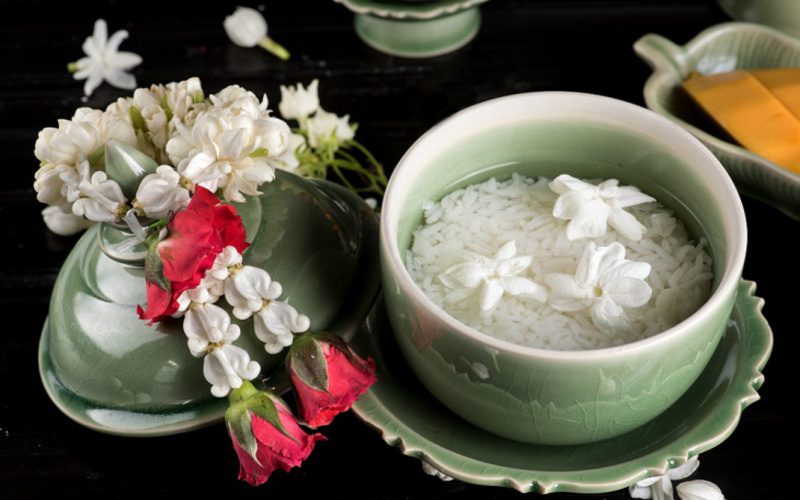
Khao Chae, a refreshing traditional dish to cool off during the Songkran festival season
Street Food to Try During the Festival
The streets during Songkran are lined with vendors offering a tantalizing array of street food. The festival atmosphere is a perfect excuse to sample these quick bites, which are both delicious and convenient for those on the go. Satay skewers, Pad Thai, and spring rolls are among the must-try items. Additionally, Mango Sticky Rice has become a popular treat, combining sweet ripe mangoes with glutinous rice and coconut milk. Khanom Krok, small coconut pancakes, is another favorite, offering a sweet and creamy bite-sized snack. Street food during Songkran is not just about satisfying hunger; it’s a way to immerse yourself in the vibrant local culture and enjoy the festive spirit.
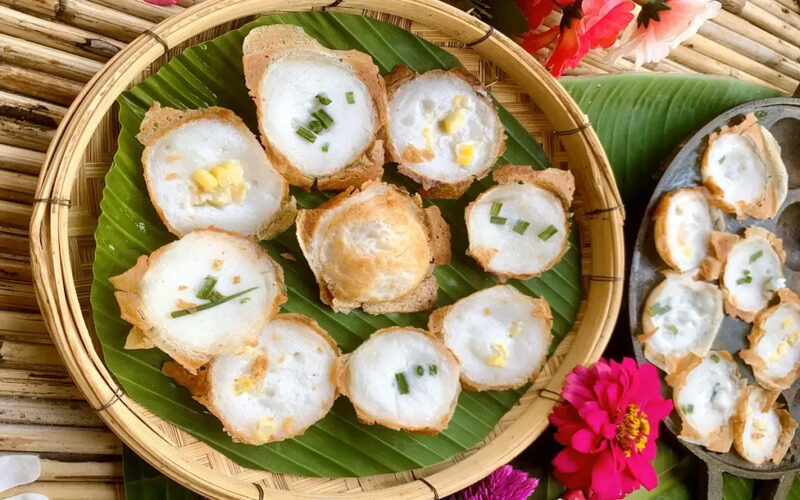
Khanom Krok, Thai coconut pancakes
Refreshing Beverages to Beat the Heat
Given that Songkran takes place during Thailand’s hottest month, staying hydrated and cool is crucial. Fortunately, the festival offers an array of refreshing beverages to help you beat the heat.
Nam Ma-Toom (bael fruit tea) is a traditional drink known for its cooling properties and health benefits. Cha Yen (Thai iced tea) and Nom Yen (iced milk with syrup) are popular choices, offering sweet relief from the sweltering temperatures. Fresh fruit juices and smoothies, made from tropical fruits like mango, pineapple, and watermelon, are widely available and provide a delicious way to stay refreshed. For those looking for something more unique, try Luk Chup (miniature fruit-shaped sweets) that are as delightful to look at as they are to eat, often paired with cold drinks to enhance the experience.
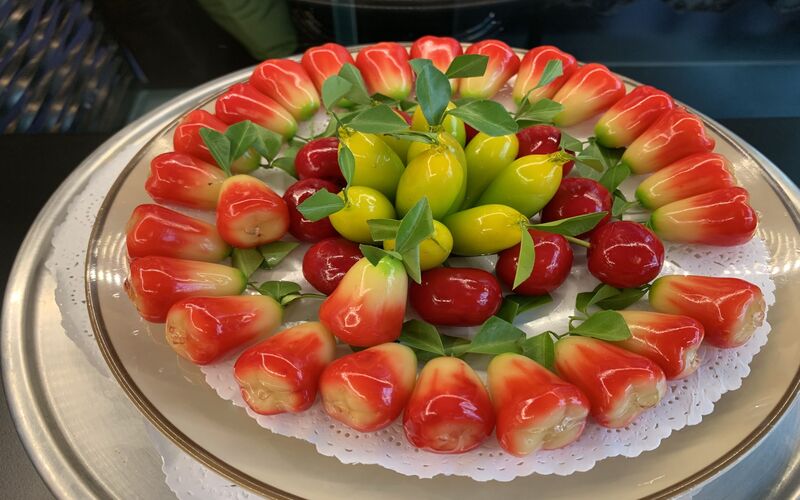
Luk Chup, a traditional Thai dessert
Travel Tips for Songkran Festival
Best Time to Visit Thailand for Songkran
The Songkran Festival typically takes place from April 13th to 15th, though celebrations can start a few days earlier and extend a few days longer in some areas. To experience the festival in its full glory, plan to arrive in Thailand a couple of days before the official start. This will give you time to acclimate and enjoy the buildup to the main events. Major cities like Bangkok, Chiang Mai, and Pattaya are popular destinations for Songkran, each offering unique ways to celebrate.
Packing Essentials for Songkran
When packing for Songkran, it’s crucial to prepare for the water-filled festivities. Here are some essentials to bring:
- Waterproof Bags: Protect your valuables, such as phones, wallets, and cameras, from getting soaked.
- Quick-Dry Clothing: Wear lightweight, quick-dry clothes to stay comfortable. Avoid wearing anything too heavy or that takes a long time to dry.
- Waterproof Footwear: Opt for sandals or water shoes that can handle getting wet and provide good grip on slippery surfaces.
- Sunscreen and Sunglasses: Protect yourself from the sun, as the festivities often take place outdoors during the hottest part of the year.
- Extra Clothes: Bring spare clothes to change into after participating in water fights or when you need a dry set for other activities.
Safety Tips for Participating in Water Fights
While Songkran’s water fights are a highlight of the festival, it’s important to stay safe and considerate:
- Use Clean Water: Always use clean, preferably filtered water for water fights. Avoid throwing ice or dirty water, which can cause injuries or infections.
- Protect Your Eyes and Ears: Consider wearing goggles or sunglasses to protect your eyes from water and other substances. Avoid spraying water directly into people’s faces.
- Mind Your Belongings: Keep your valuables in waterproof bags or leave them at your accommodation to prevent loss or damage.
- Respect Local Customs: While the water fights are fun, remember that Songkran has deep cultural and religious significance. Show respect during traditional ceremonies and rituals.
- Stay Hydrated and Take Breaks: The combination of heat and physical activity can be exhausting. Drink plenty of water and take regular breaks to avoid dehydration and fatigue.
Experiencing the Songkran Festival is more than just partaking in joyous water fights; it is an immersion into Thailand’s deep cultural heritage and vibrant community spirit. From the traditional rituals and family-friendly activities to the delicious food and exhilarating street parties, Songkran offers a comprehensive glimpse into the heart of Thai culture. Whether you’re traveling with family, friends, or solo, the festival promises an unforgettable experience filled with warmth, laughter, and cultural enrichment. Let us help you plan your trip, pack your essentials, and get ready to dive into the world’s most spirited water festival, where every splash carries a wish for good fortune and happiness in the coming year.
Read more:
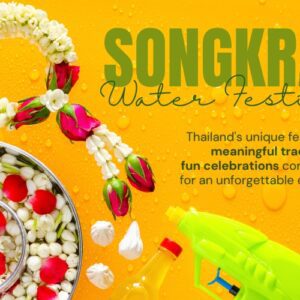

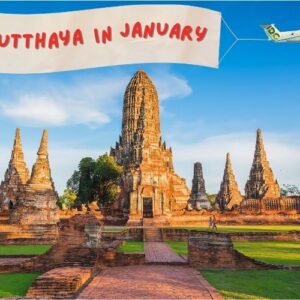
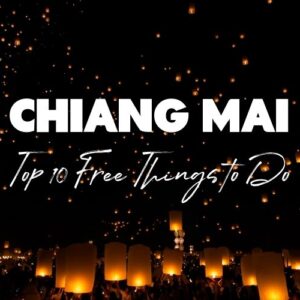
Thanks for the awesome write-up! Songkran looks so much more than just a water fight — I had no idea about the temple visits and the meaning behind the celebrations. Are there any places where I can see the more spiritual side of the festival?
Thanks so much for your kind words! Beyond the water fights, Songkran is a truly meaningful celebration. If you’re interested in the spiritual side, places like Chiang Mai and Ayutthaya are great options, where you can witness traditional rituals, visit temples, and even take part in merit-making activities. It’s a beautiful way to experience Thai culture on a deeper level. If you’d like, we can suggest some specific spots or tours focused on this side of the festival!
Best regards,
IDC Travel Team